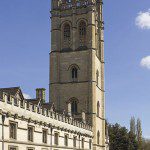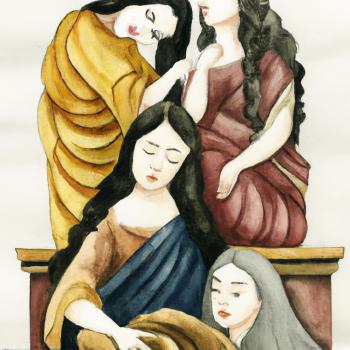The early Christians then shared in the "breaking of the bread" (Acts 2:42c). This does not refer to common shared meals, but to ritual acts of what we now call communion. Luke was very concerned to make it clear that Jesus was to be experienced most consistently in the breaking of the bread, a sacred meal he had consecrated before his death, and had participated in after his resurrection with those despondent disciples on the road to Emmaus (Luke 24:35). Jesus is best seen now in the regular breaking of the bread. That does cause one to ask why so many mainline churches only celebrate the sacred Eucharist at most once a month. The meal is, according to Luke, one of the four hallmarks of a Christian community.
And the earliest Christians were people of constant and continuous prayer. Note that Luke calls this activity "the prayers." By this he apparently means less in the way of spontaneous individual prayers, but rather prayers done in community and prayers known in community. Individual praying is fine, but prayer in community is what helps to define true Christian community.
"They had all things in common; they would sell their possessions and goods and distribute them to all, as any had need" (Acts 2:44-45). This astonishing claim is most at odds with what we modern Christians have been about since the rise of capitalism among us. This early Christian reality perhaps helps to explain why so many modern Christian organizations talk so much about issues of individual morality; sharing one's possessions with "any who had need" is another kettle of fish altogether. It suggests a demand that many of us, myself too often included, are simply unwilling to follow. Or of we do follow it, we do it grudgingly, and minimally. The average gift to a church remains less than 2 percent of income; this is even true among those communities that focus hardest on the demand of the tithe. Now it cannot be denied that Luke's portrait here is surely an ideal; it is hard to imagine that all early Christians were eager and ready to sell what they had amassed and hand it over to the poor among them. That is made certain by Luke's quite dreadful stories that quickly follow this picture of remarkable sharing, stories that speak of certain community members who were not willing to share at all.
Yet, idealized as it may be, Luke's picture has continued to be highly influential in Christian history as a high bar defining the true Christian family of believers. One has only to look at the 20th-century liberation theologians of Latin America especially to see their attempts to live out what Luke described twenty centuries before.
And what of us, we 21st-century Christians, wrapped up in our warm blankets of capitalistic ease? Can we hear Luke call to us, urging us to "hold all things in common," never to forget the poor among us? Until we do, he warns, we cannot finally and comfortably call ourselves Christians, members of a Christian family.





